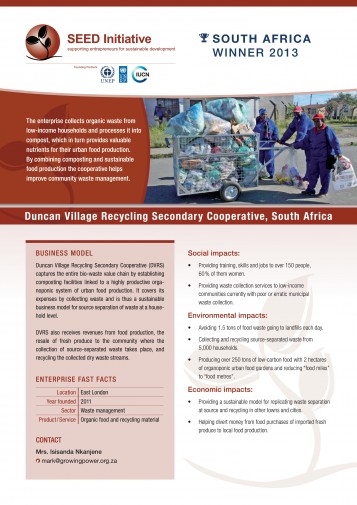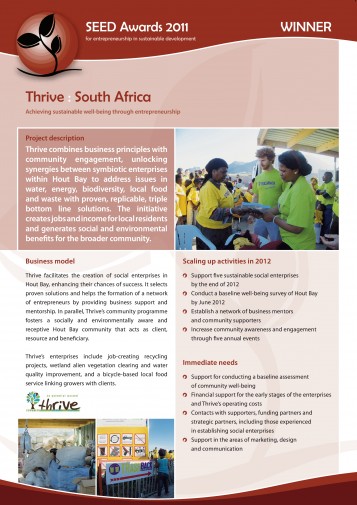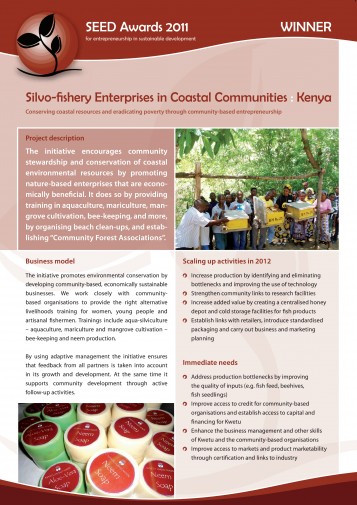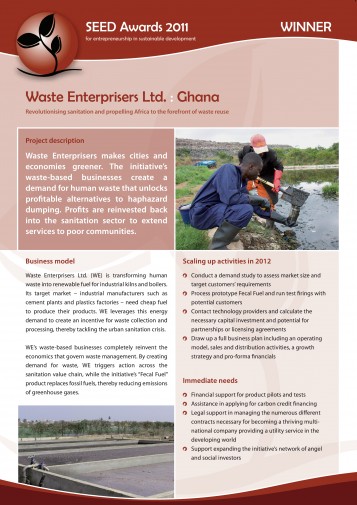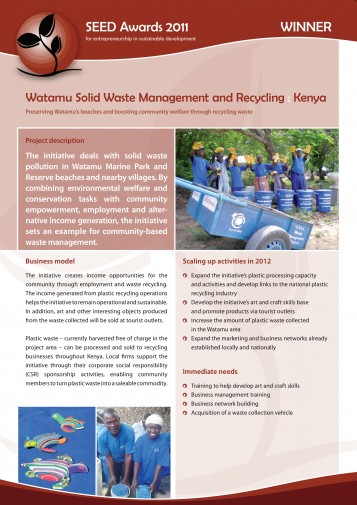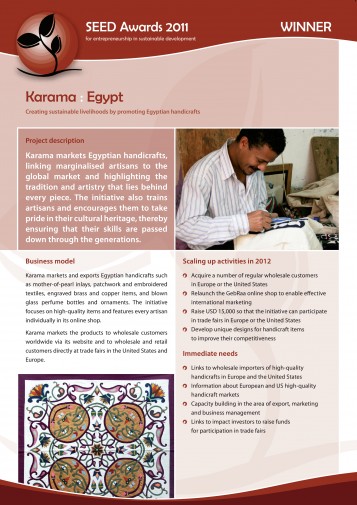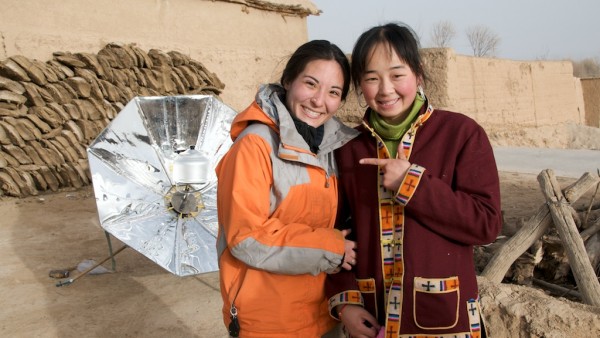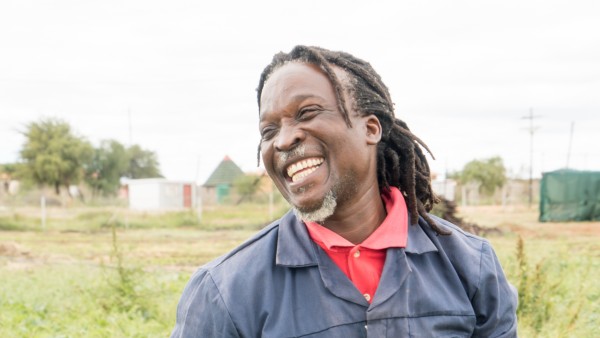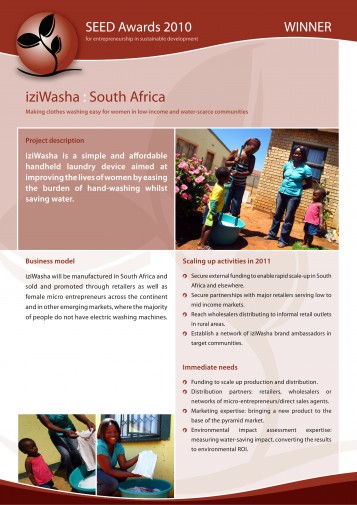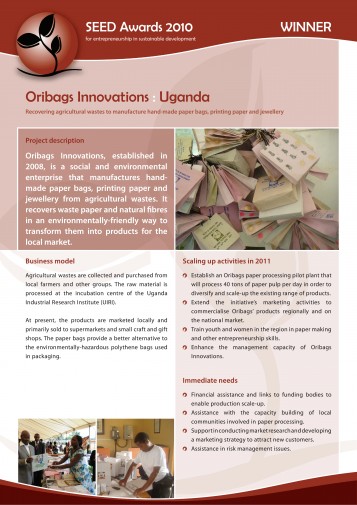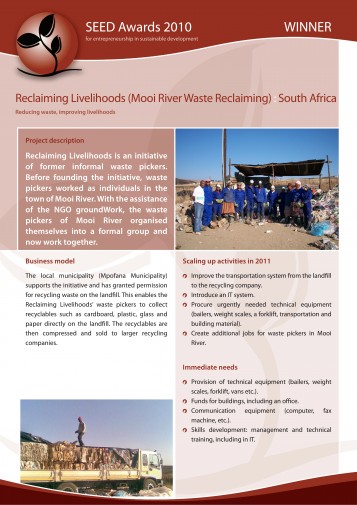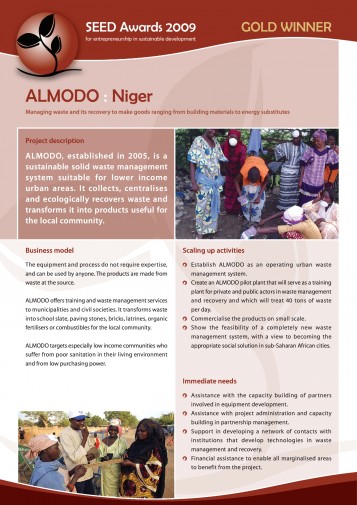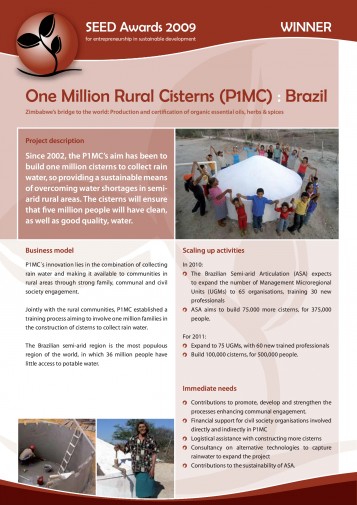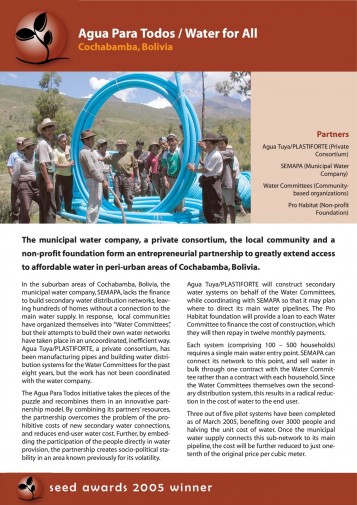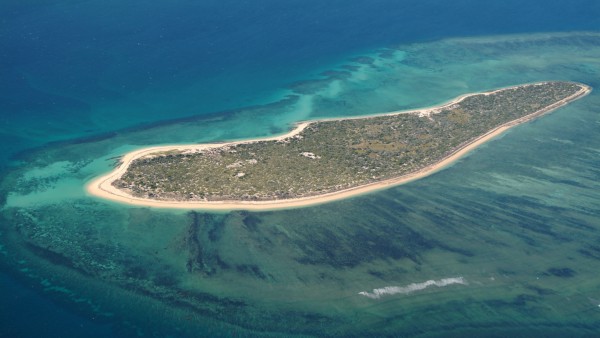Enterprise Brief: Duncan Village Secondary Recycling Cooperative
Published: 30 August 2013
The enterprise collects organic waste from low-income households and processes it into compost, which in turn provides valuable nutrients for their urban food production. By combining composting and sustainable food production the cooperative helps improve community waste management. Read more
SDGs:







Enterprise Brief: Thrive
Published: 30 August 2011
Thrive combines business principles with community engagement, unlocking synergies between symbiotic enterprises within Hout Bay to address issues in water, energy, biodiversity, local food, and waste with proven, replicable, triple bottom line solutions. The initiative creates jobs and income for local residents and generates social and environmental benefits for the broader community. Read more
SDGs:









Enterprise Brief: Upscaling the siliviculture based enterprises of coastal communities in Kenya
Published: 30 August 2011
The initiative encourages community stewardship and conservation of coastal environmental resources by promoting nature-based enterprises that are economically beneficial. It does so by providing training in aquaculture, mariculture, mangrove cultivation, bee-keeping, and more, by organising beach clean-ups, and establishing “Community Forest Associations” Read more
SDGs:







Enterprise Brief: Waste Enterprisers
Published: 30 August 2011
Waste Enterprisers makes cities and economies greener. The initiative’s waste-based businesses create a demand for human waste that unlocks profitable alternatives to haphazard dumping. Profits are reinvested back into the sanitation sector to extend services to poor communities. Read more
SDGs:







Enterprise Brief: Watamu Community Solid Waste Management and Recycling Enterprises
Published: 30 August 2011
The initiative deals with solid waste pollution in Watamu Marine Park and Reserve beaches and nearby villages. By combining environmental welfare and conservation tasks with community empowerment, employment and alternative income generation, the initiative sets an example for community-based waste management. Read more
SDGs:









Enterprise Brief: Karama
Published: 29 August 2011
Karama markets Egyptian handicrafts, linking marginalised artisans to the global market and highlighting the tradition and artistry that lies behind every piece. The initiative also trains artisans and encourages them to take pride in their cultural heritage, thereby ensuring that their skills are passed down through the generations. Read more
SDGs:









From bamboo bikes to biomass briquettes: UNEP unveils SEED Award Winners
Constance Hybsier Source: UN Environment
A novel solar device that turns waste heat into electricity in rural China, a Ugandan business that manufactures stationary from agricultural waste, a bamboo bicycle project in Ghana and a female-run business in South Africa making a hand-held laundry device that saves water are among the 30 winners of the 2010 SEED Awards, the United Nations Environment Programme (UNEP) announced today. Read more
SDGs:











Announcement: Meet the 2010 SEED Winners!
Published: 03 November 2010
The SEED Initiative is thrilled to announce its 2010 SEED Award Winners! From bamboo bicycles to fly-fisheries, from businesswomen's collectives to inspired youth, these entrepreneurs are building a more sustainable world, starting in their own communities. Read more
SDGs:









Enterprise Brief: IziWasha
Published: 29 August 2010
IziWasha is a simple and affordable handheld laundry device aimed at improving the lives of women by easing the burden of hand-washing whilst saving water. Read more
SDGs:







Enterprise Brief: ORIBAGS INNOVATIONS
Published: 29 August 2010
Oribags Innovations, established in 2008, is a social and environmental enterprise that manufactures handmade paper bags, printing paper and jewellery from agricultural wastes. It recovers waste paper and natural fibres in an environmentally-friendly way to transform them into products for the local market. Read more
SDGs:





Enterprise Brief: Reclaiming Livelihoods – Mooi River Waste Reclaiming
Published: 29 August 2010
Reclaiming Livelihoods is an initiative of former informal waste pickers. Before founding the initiative, waste pickers worked as individuals in the town of Mooi River. With the assistance of the NGO groundWork, the waste pickers of Mooi River organised themselves into a formal group and now work together. Read more
SDGs:













Enterprise Brief: Almodo
Published: 24 August 2009
ALMODO, established in 2005, is a sustainable solid waste management system suitable for lower income urban areas. It collects, centralises and ecologically recovers waste and transforms it into products useful for the local community. Read more
SDGs:





Enterprise Brief: One Million Rural Cisterns
Published: 24 August 2009
Since 2002, the P1MC’s aim has been to build one million cisterns to collect rain water, so providing a sustainable means of overcoming water shortages in semiarid rural areas. The cisterns will ensure that five million people will have clean,as well as good quality, water. Read more
SDGs:





Enterprise Brief: Water for All
Published: 23 August 2005
The municipal water company, a private consortium, the local community and a non-profit foundation form an entrepreneurial partnership to greatly extend access to affordable water in peri-urban areas of Cochabamba, Bolivia. Read more
SDGs:









From Cows to Kilowatts and Berries into Businesses - Winners of the First Seed Awards Announced
Published: 20 April 2005
The winners were selected from a pool of over 260 entries from 66 countries, representing 1,200 organisations. Read more
SDGs:


















